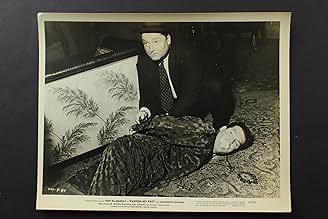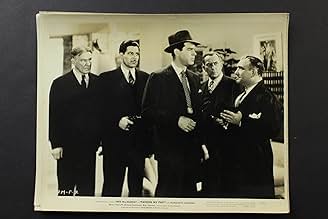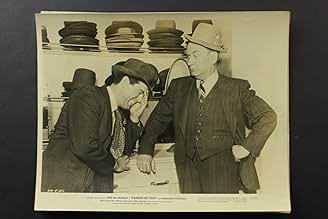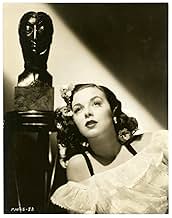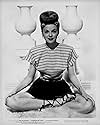Füge eine Handlung in deiner Sprache hinzuAn ex-GI wants to open a mink farm in Wisconsin, but is mistaken for a look-alike gambler who owes a lot of money.An ex-GI wants to open a mink farm in Wisconsin, but is mistaken for a look-alike gambler who owes a lot of money.An ex-GI wants to open a mink farm in Wisconsin, but is mistaken for a look-alike gambler who owes a lot of money.
George Chandler
- Cab Driver
- (Nicht genannt)
Jimmie Dundee
- Policeman at Pemberton Home
- (Nicht genannt)
Edward Gargan
- Policeman at Pemberton Home
- (Nicht genannt)
J. Farrell MacDonald
- Policeman
- (Nicht genannt)
Empfohlene Bewertungen
Despite the best intentions of all concerned, "Pardon My Past" emerges as a tired and tiresome comedy of errors with every player trying to make up for the lack of wit in the dialogue and absence of comic inventiveness in the plot by overplaying his or her part to the hilt. True, Dewey Robinson's bungling detective does manage to bring a touch of genuine humor to the proceedings; and even overly repetitious dialogue cannot completely take the edge off Tamiroff's smooth portrayal. There's also no doubt that Miss Chapman makes an attractive heroine. But gross overacting by most of the other players overwhelms the viewer. Unimaginative direction doesn't help. Although MacMurray has a dual role, there are no special effects, except in the one mildly effervescent shot in the entire film: The camera, tracking with MacMurray and Demarest as they flee across the lawn, picks up a cab which it follows back to the house where it closes in on MacMurray emerging. A rather neat trick certainly, and it's all delivered in the one shot without a cut. Metty's photography is consistently glossy, but other credits are undistinguished. Production values are no more than fair. Most of the action takes place in the one set. Dimitri Tiomkin composed and conducted the music score. Make-up was supervised by Otis Malcolm. The production manager was Scotty Rankin. Otho Lovering is credited as supervising film editor. (This means that he was present on the set and advised the director on camera set-ups).
Eddie York (Fred MacMurray) and his buddy Chuck (William Demarest) fresh from the service want nothing else from life but to open a mink ranch with the dough they've saved up while doing their service. Problems pop up almost instantly when they get out, Eddie is strong armed out of his dough by a tough who says he welshed on a gambling debt that he knows nothing about.
Turns out Eddie is a dead ringer for another guy who it turns out has a lot of money, a bad reputation, a complicated home life and has apparently skipped town. So starts a merry chase for both an explanation and their money.
Charming little comedy with Fred most appealing in a dual role backed up by a dream cast of some of the best character actors working at the time. Catch this under-known gem when you get the chance, you won't be sorry.
Turns out Eddie is a dead ringer for another guy who it turns out has a lot of money, a bad reputation, a complicated home life and has apparently skipped town. So starts a merry chase for both an explanation and their money.
Charming little comedy with Fred most appealing in a dual role backed up by a dream cast of some of the best character actors working at the time. Catch this under-known gem when you get the chance, you won't be sorry.
Fred MacMurray and William Demarest, just out of the army, are on their way to Wisconsin to start up a mink farm. Their plans change when Fred is waylaid on the sidewalk by some tough guys who insist he is somebody named Pemberton who owes them lots of money.
The plot starts from there and develops into a wild tale that includes an honest bookie, a crooked uncle, an estranged wife and child, and a long lost twin.
MacMurray and Demarest are both excellent. No one ever expressed sputtering bewilderment or mild-mannered outrage better than Fred MacMurray; and no one but Bill Demarest could be quite so great delivering a line like, "Oh, get back under the house, you termite!" (Barked at Douglass Dumbrille, the wicked uncle.)
The picture also includes fine performance from Harry Davenport as the patriarch ("I'm just the grandpa—the only Pemberton that ever did an honest day's work in three generations!"); Marguerite Chapman as a family secretary who tries to figure MacMurray out; and especially Akim Tamaroff as a bookie with an appreciation for old books and a keen sense of fair play.
Just delightful, especially for those who love great character actors.
The plot starts from there and develops into a wild tale that includes an honest bookie, a crooked uncle, an estranged wife and child, and a long lost twin.
MacMurray and Demarest are both excellent. No one ever expressed sputtering bewilderment or mild-mannered outrage better than Fred MacMurray; and no one but Bill Demarest could be quite so great delivering a line like, "Oh, get back under the house, you termite!" (Barked at Douglass Dumbrille, the wicked uncle.)
The picture also includes fine performance from Harry Davenport as the patriarch ("I'm just the grandpa—the only Pemberton that ever did an honest day's work in three generations!"); Marguerite Chapman as a family secretary who tries to figure MacMurray out; and especially Akim Tamaroff as a bookie with an appreciation for old books and a keen sense of fair play.
Just delightful, especially for those who love great character actors.
While Fred MacMurray had always held warm feelings for the hometown where he had always been a star, regardless of his Hollywood career, he used Pardon My Past to deliver his most direct tribute to the small Wisconsin community of Beaver Dam.
During MacMurray's childhood, Beaver Dam was relatively isolated at the center point between Milwaukee, Madison, and Green Bay. Before the advent of the freeway, none of these cities were any less than a day's travel one-way. So, the budding star had to make due with his limited audience, and never disappointed his hometown.
Pardon My Past was the only movie MacMurray ever produced himself. It is the story of two GIs coming back to America after World War II, heading to Beaver Dam to start a mink farm. The city is made reference to no fewer than eight times, or once every eleven minutes, in the movie.
Fred never forgot his roots, he never grew too far away from his home. He adored the friends he made and he loved the city of Beaver Dam up until the day of his death in 1991. He was truly a rarity from any era of Hollywood, and, speaking as a fellow graduate of Beaver Dam High School, we are proud to have called him our own.
During MacMurray's childhood, Beaver Dam was relatively isolated at the center point between Milwaukee, Madison, and Green Bay. Before the advent of the freeway, none of these cities were any less than a day's travel one-way. So, the budding star had to make due with his limited audience, and never disappointed his hometown.
Pardon My Past was the only movie MacMurray ever produced himself. It is the story of two GIs coming back to America after World War II, heading to Beaver Dam to start a mink farm. The city is made reference to no fewer than eight times, or once every eleven minutes, in the movie.
Fred never forgot his roots, he never grew too far away from his home. He adored the friends he made and he loved the city of Beaver Dam up until the day of his death in 1991. He was truly a rarity from any era of Hollywood, and, speaking as a fellow graduate of Beaver Dam High School, we are proud to have called him our own.
I can take Fred MacMurray or leave him, and I 'd usually prefer the latter, but you have to admit he is not pushy and definitely ignorable. In this amusing mistaken-identity farce, he is far less assertive than William Demarest (but, then, everybody is), and the lovely Rita Johnson and Marguerite Chapman have more warmth and sex appeal. Harry Davenport, that angel in human shape, is far more peppery than usual, but still utterly endearing as the perpetually outraged grandpa.
Another excellent performer is Akim Tamiroff, showing that he can parody silken menace as well as he can play it straight, which is very good indeed. His gangster is a bibliophile, which is an original touch--between threats of violence he caresses lovingly, not a kitten but a rare edition of Shakespeare.
With a better script than is usual for this sort of caper, it's a very pleasant little film, one's only qualm being that, these days, Fred would be the villain of the piece---his occupation? Fur farmer.
Another excellent performer is Akim Tamiroff, showing that he can parody silken menace as well as he can play it straight, which is very good indeed. His gangster is a bibliophile, which is an original touch--between threats of violence he caresses lovingly, not a kitten but a rare edition of Shakespeare.
With a better script than is usual for this sort of caper, it's a very pleasant little film, one's only qualm being that, these days, Fred would be the villain of the piece---his occupation? Fur farmer.
Wusstest du schon
- Wissenswertes"Lux Radio Theater" broadcast a 60 minute radio adaptation of the movie on May 13, 1946 with Fred MacMurray and Marguerite Chapman reprising their film roles.
- PatzerWhen Eddie and Chuck go to look up Pemberton in the phone book, entries above, below and in the column to the right are out of alphabetical order.
- Zitate
Chuck Gibson: What does a mink do? Does it baaa, growl, meow or coo?
Eddie York: It makes more minks.
- VerbindungenReferenced in Charmed: Zauberhafte Hexen: Pardon My Past (2000)
Top-Auswahl
Melde dich zum Bewerten an und greife auf die Watchlist für personalisierte Empfehlungen zu.
Details
- Laufzeit1 Stunde 28 Minuten
- Farbe
- Seitenverhältnis
- 1.37 : 1
Zu dieser Seite beitragen
Bearbeitung vorschlagen oder fehlenden Inhalt hinzufügen


